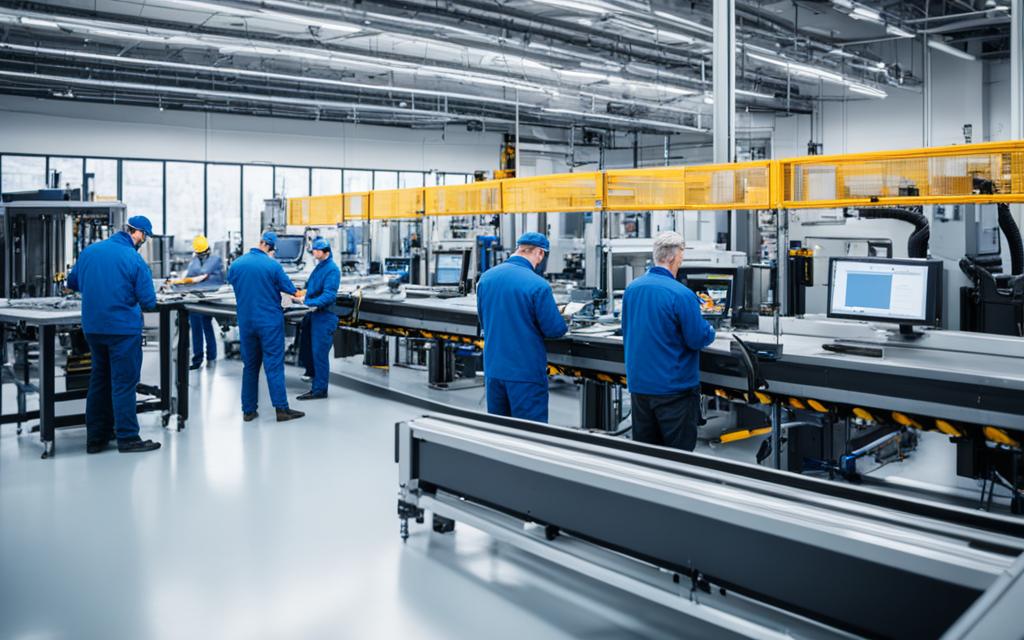Welcome to our comprehensive guide on ERP systems for the manufacturing industry. In this article, we will explore the importance of finding the right solution to meet your specific needs in the manufacturing sector. Whether you are a small-scale manufacturer or a large enterprise, implementing an ERP system can streamline your operations, improve productivity, and enhance overall efficiency.
Manufacturing ERP software plays a crucial role in managing complex business processes, such as inventory management, supply chain management, production planning, and quality control. By integrating these functions into a unified system, you can gain real-time visibility into your entire manufacturing operation, enabling informed decision-making and driving growth.
With an array of ERP options available, it’s essential to choose the software that aligns perfectly with your organization’s specific requirements. This decision can have a significant impact on your operational efficiency and long-term success.
Throughout this guide, we will help you navigate the world of manufacturing ERP software, providing valuable insights into finding the best solution, implementing it successfully, and reaping the benefits of cloud-based ERP systems. Additionally, we will explore affordable options that deliver maximum value within your budget.
Join us as we delve into the realm of ERP systems for manufacturing and equip you with the knowledge and tools to make the right choice for your business.
Finding the Best ERP Software for Manufacturing Industry
When it comes to managing operations in the manufacturing industry, having the right ERP software can make all the difference. The best ERP software for manufacturing industry is designed to streamline processes, optimize resource utilization, and enhance overall efficiency. Therefore, selecting the right ERP solution that aligns with your specific business needs is crucial.

With so many ERP solutions available in the market, finding the one that suits your manufacturing company can be overwhelming. To help you make an informed decision, we have compiled a list of top ERP software options that cater specifically to the manufacturing industry.
Key Features and Functionalities to Look for
- Supply chain management: A robust ERP system should provide comprehensive supply chain management capabilities, including inventory management, demand forecasting, and procurement.
- Production planning and scheduling: Look for software that offers advanced production planning and scheduling tools to optimize resource allocation and minimize downtime.
- Quality control and compliance: Manufacturing ERP software should include features to ensure product quality and compliance with industry regulations.
- Shop floor control: Real-time monitoring and control of shop floor operations is essential for efficient production management.
- Reporting and analytics: Access to accurate real-time data and customizable reporting capabilities enable better decision-making and performance monitoring.
By prioritizing these key features and functionalities, you can narrow down your options and select the ERP solution that aligns best with your manufacturing processes.
In the next section, we will delve into the implementation of ERP systems in the manufacturing industry, providing valuable tips for a successful implementation process.
Implementing ERP Systems for Manufacturing: Tips for Success
Implementing an ERP system in a manufacturing company can be a transformative process, streamlining operations, improving efficiency, and enhancing decision-making. However, it is crucial to approach the implementation with careful planning and consideration to ensure a successful transition. Here are some valuable tips to help you navigate the process and maximize the benefits of ERP implementation for manufacturing.

1. Define Your Goals and Requirements
Before getting started, clearly define your goals and requirements for implementing an ERP system in your manufacturing company. Identify the specific pain points you want to address and the outcomes you expect to achieve. This will serve as a guide throughout the implementation process and help you select the most suitable ERP solution.
2. Involve Key Stakeholders
Successful ERP implementation requires the involvement and commitment of key stakeholders across different departments and levels of the organization. Establish a cross-functional implementation team that includes representatives from manufacturing, finance, inventory, and other relevant areas. Their insights and expertise will contribute to a more comprehensive and effective implementation process.
3. Conduct a Thorough System Evaluation
Prior to selecting an ERP system, conduct a thorough evaluation of various software options to ensure they meet your specific manufacturing requirements. Look for features such as production planning, inventory management, quality control, and supply chain integration. Consider cloud-based solutions for their scalability, flexibility, and ease of access.
4. Develop a Comprehensive Implementation Plan
Develop a detailed implementation plan that outlines key milestones, timelines, and responsibilities. Break down the implementation process into manageable phases to ensure a step-by-step approach. This will help you stay organized, track progress, and address any challenges in a systematic manner.
5. Provide Adequate Training and Support
Invest in comprehensive training programs to ensure your employees are comfortable and confident in using the new ERP system. Provide ongoing support and resources to address any questions or concerns that may arise during the implementation process. This will help minimize resistance to change and foster a positive adoption of the new system.
6. Test and Validate Before Go-Live
Before fully deploying the ERP system, conduct rigorous testing and validation to ensure it functions as intended. This includes testing data migration, system integrations, and user acceptance. Identify and resolve any issues or discrepancies to avoid disruptions in your manufacturing operations post-implementation.
7. Monitor and Continuously Improve
Once the ERP system is live, monitor its performance and gather feedback from users to identify areas of improvement. Regularly review and optimize your processes to leverage the full potential of the system. Stay up to date with software updates and new functionalities that can further enhance your manufacturing operations.
By following these tips, you can navigate the implementation process smoothly and derive the maximum value from your ERP system in the manufacturing industry. Remember, successful implementation is not just about the technology but also about effective change management and collaboration within your organization.
The Advantages of Cloud ERP for Manufacturing
Cloud ERP solutions have revolutionized the manufacturing industry, offering numerous advantages that traditional on-premise systems cannot match. In this section, we will explore the benefits of cloud-based ERP systems for manufacturing companies and highlight why they are becoming the preferred choice for many organizations.
Scalability
One of the key advantages of cloud ERP for manufacturing is its scalability. With cloud-based systems, businesses can easily scale their operations up or down based on demand. Whether you are a small manufacturer or a large enterprise, cloud ERP allows you to align your resources and infrastructure with your changing business needs, ensuring optimal efficiency and cost-effectiveness.
Accessibility
Cloud ERP systems provide unparalleled accessibility for manufacturing companies. With a cloud-based solution, all relevant data and functionalities are accessible anytime, anywhere, as long as you have an internet connection. This means that key stakeholders, whether they are on the shop floor or remote locations, can access real-time information and collaborate seamlessly. Enhancing accessibility eliminates delays and facilitates faster decision-making, leading to improved overall efficiency.
Data Security
Data security is a significant concern for manufacturing companies, as they deal with sensitive and proprietary information. Cloud ERP systems offer robust security measures to protect critical data. Reputable cloud ERP providers utilize advanced encryption, regular data backups, and multiple layers of security protocols to safeguard information from unauthorized access, ensuring compliance with industry regulations.
Cost Savings
Cloud ERP for manufacturing can help companies reduce costs significantly. By eliminating the need for expensive on-site infrastructure and maintenance, cloud-based systems offer a more affordable option for companies with limited IT budgets. Additionally, cloud ERP eliminates the costs associated with software upgrades and ongoing maintenance, as these responsibilities are handled by the provider. This allows manufacturers to focus their financial resources on core business activities and innovation.
Overall, cloud ERP systems provide manufacturing companies with the flexibility, accessibility, security, and cost effectiveness needed to succeed in today’s competitive market. By harnessing the power of the cloud, manufacturers can streamline their operations, enhance collaboration, and drive growth in an increasingly digitized industry.
Affordable ERP Systems for Manufacturing: Maximizing Value for Budget-conscious Companies
When it comes to ERP systems for the manufacturing industry, finding the right solution that fits within your budget is crucial. Fortunately, there are affordable ERP systems available that can provide robust functionalities while still offering a high return on investment.
One important factor to consider when evaluating the cost-effectiveness of an ERP system for manufacturing is the scalability it offers. Look for a system that can grow with your business and adapt to changing needs without requiring expensive upgrades or additional modules.
Another key consideration is the ease of implementation and ongoing maintenance. Affordable ERP systems should not only have a lower initial investment but also require minimal resources for installation, training, and support. Look for vendors that offer comprehensive training programs and responsive customer support to ensure a smooth and efficient implementation process.
Finally, consider the long-term benefits an affordable ERP system can provide. Look for features such as inventory management, production planning, and real-time data analytics that can streamline operations, improve productivity, and drive cost savings. By carefully evaluating the cost-effectiveness of an ERP system and selecting an affordable option that meets your specific needs, you can maximize the value for your budget-conscious manufacturing company.